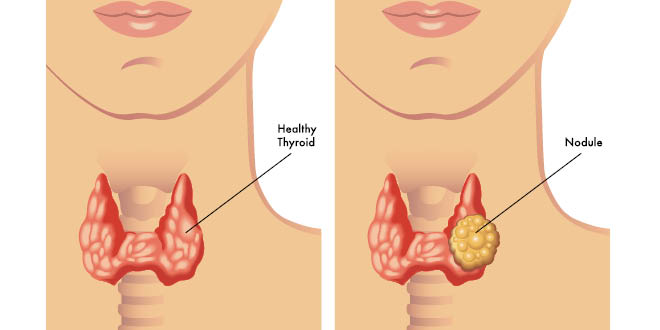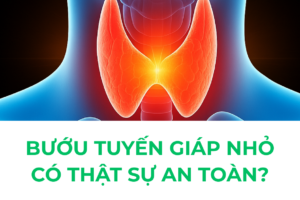What is the thyroid gland?
The thyroid gland is a butterfly-shaped endocrine gland that is normally located in the lower front of the neck. The thyroid’s job is to make thyroid hormones, which are secreted into the blood and then carried to every tissue in the body. Thyroid hormone helps the body use energy, stay warm and keep the brain, heart, muscles, and other organs working as they should.
What is a thyroid nodule?
The term thyroid nodule refers to an abnormal growth of thyroid cells that forms a lump within the thyroid gland. Although the vast majority of thyroid nodules are benign (noncancerous), a small proportion of thyroid nodules do contain thyroid cancer. In order to diagnose and treat thyroid cancer at the earliest stage, most thyroid nodules need some type of evaluation.

Thyroid nodule
What are the symptoms of a thyroid nodule?
Most thyroid nodules do not cause symptoms. Often, thyroid nodules are discovered incidentally during a routine physical examination or on imaging tests like CT scans or neck ultrasound done for completely unrelated reasons. Occasionally, patients themselves find thyroid nodules by noticing a lump in their neck while looking in a mirror, buttoning their collar, or fastening a necklace. Abnormal thyroid function tests may occasionally be the reason a thyroid nodule is found. Thyroid nodules may produce excess amounts of thyroid hormone causing hyperthyroidism (see Hyperthyroidism brochure). However, most thyroid nodules, including those that cancerous, are actually non-functioning, meaning tests like TSH are normal. Rarely, patients with thyroid nodules may complain of pain in the neck, jaw, or ear. If a nodule is large enough to compress the windpipe or esophagus, it may cause difficulty with breathing, swallowing, or cause a “tickle in the throat”. Even less commonly, hoarseness can be caused if the nodule invades the nerve that controls the vocal cords but this is usually related to thyroid cancer.
The important points to remember are the following:
- Thyroid nodules generally do not cause symptoms.
- Thyroid tests are most typically normal—even when cancer is present in a nodule.
- The best way to find a thyroid nodule is to make sure your doctor checks your neck!
What causes thyroid nodules and how common are they?
We do not know what causes most thyroid nodules but they are extremely common. By age 60, about one-half of all people have a thyroid nodule that can be found either through examination or with imaging. Fortunately, over 90% of such nodules are benign. Hashimoto’s thyroiditis, which is the most common cause of hypothyroidism (see Hypothyroidism brochure), is associated with an increased risk of thyroid nodules. Iodine deficiency, which is very uncommon in the United States, is also known to cause thyroid nodules.
How is a thyroid nodule evaluated and Diagnosed?
Once the nodule is discovered, your doctor will try to determine whether the rest of your thyroid is healthy or whether the entire thyroid gland has been affected by a more general condition such as hyperthyroidism or hypothyroidism. Your physician will feel the thyroid to see whether the entire gland is enlarged and whether a single or multiple nodules are present. The initial laboratory tests may include measurement of thyroid hormone (thyroxine, or T4) and thyroid-stimulating hormone (TSH) in your blood to determine whether your thyroid is functioning normally.
Since it’s usually not possible to determine whether a thyroid nodule is cancerous by physical examination and blood tests alone, the evaluation of the thyroid nodules often includes specialized tests such as thyroid ultrasonography and fine needle biopsy.





